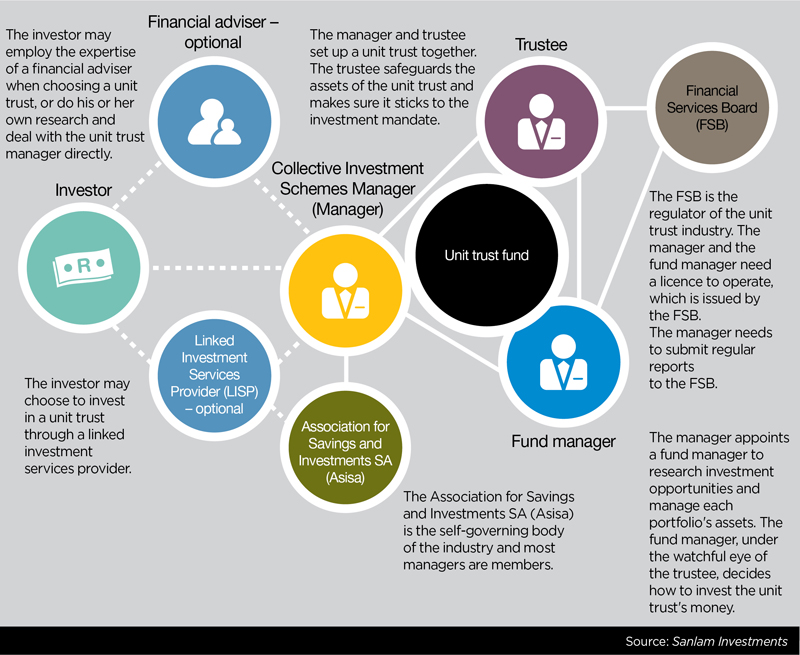How Safe Is Your Unit Trust Money?

If you invest in unit trusts, your investment is regulated by law. In addition, the way in which the different roles are split up makes it very difficult for any one of the parties to disappear with your money.
Key role players
The trustee
By law, before a unit trust can be launched, the unit trust management company (manager) needs to appoint a trustee to safeguard the assets of the unit trust.
The trustee is usually a bank or other financial institution that is in no way associated with the manager or the fund manager.
The trustee must be independent, and cannot be a subsidiary or holding company of the manager.
Every unit trust has a mandate that states its investment objectives and what the fund manager may do to achieve these goals. The trustee needs to make sure the fund is managed according to the rules of the mandate and the Collective Investment Schemes Control Act.
The Financial Services Board (FSB)
The manager needs approval from the FSB before a new unit trust can be launched. Certain stipulated information is also reported to the FSB.
The FSB has the power to request an audit, to instruct a manager or trustee to terminate any undesirable practice, to fine the manager and to apply to the court for the winding-up of a manager or a unit trust.
The Collective Investment Schemes Control Act (Cisca)
Cisca regulates how a unit trust should be managed and what information needs to be disclosed to investors.
It limits exposure to any one holding or certain asset classes, and requires specific minimum disclosures.
Cisca also empowers the Registrar to inspect, suspend or cancel the registration of a unit trust, should it suspect fraudulent or negligent activities.

What does this mean?
• Even if the manager or fund manager goes out of business, the trustee will hold your assets safely on your behalf.
• The fund manager does not have direct access to the actual money invested in the unit trust. He needs to work through the trustee.
• The potential for your investment to be affected by fraud is curbed substantially, but it cannot be entirely eliminated.
• If a company in which you are invested fails, this will have a limited impact on your total investment.
• Because the manager must disclose all instruments in the portfolio at least quarterly, you enjoy increased transparency.
But remember:
These regulations cannot protect investors against market corrections or crashes. You therefore need to make sure that you choose the funds that suit the amount of market or investment risk you are willing to take on.
Collective investment schemes are generally medium- to long-term investments. Past performances will not necessarily be repeated in future and the value of investments/unit trusts may go up and down. Collective investments are bought and sold at ruling prices and may borrow money and lend out scrip (paper). A schedule of fees and charges and maximum commissions is available from the Manager, Sanlam Collective Investments (RF) Pty Ltd, a registered and approved Manager in Collective Investment Schemes in Securities. The Manager will provide additional information on a proposed investment, including brochures, application forms and annual or quarterly reports free of charge. Collective investments are calculated on a net asset value basis, which is the total market value of all assets in the portfolio including any income accruals and less any deductible expenses, such as audit fees, brokerage and service fees. Actual investment performance will differ based on the initial fees applicable, the actual investment date, the date of reinvestment of income, as well as dividend withholding tax. Forward pricing is used. The Manager does not provide any guarantee with respect to the capital or the return of a portfolio. The performance of the portfolio depends on the underlying assets and variable market factors. International investments or investments in foreign securities could carry additional risks, such as potential constraints on liquidity and the repatriation of funds, macroeconomic risk, political risk, foreign exchange risk, tax risk and settlement risk, as well as potential limitations on the availability of market information. The Manager has the right to close any portfolios to new investors to manage them more efficiently in accordance with their mandates. The portfolio management of all the portfolios is outsourced to financial services providers that are authorised in terms of the Financial Advisory and Intermediary Services Act. Standard Bank of South Africa Ltd is the appointed trustee of the Sanlam Collective Investments scheme.





Comments are closed.